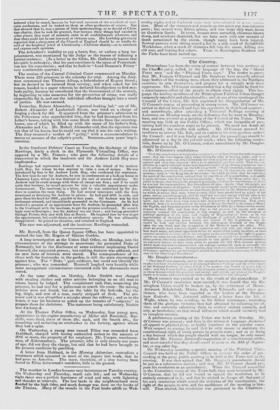Mr. Burrell, from the Queen Square Office, has been appointed
to succeed the late Mr. Rogers of Hatton Garden. Mr. Burrell, from the Queen Square Office, has been appointed to succeed the late Mr. Rogers of Hatton Garden.
A long investigation at the Union Hall Office, on Monday, into the circumstances of the attempt to assassinate the pretended Duke of Normandy, led to the disclosure of some evidence implicating Desire Roussel', the suspected person ; but nothing decisive was adduced, and no new facts of interest were stated. The correspondence of his shoes with the footmarks in the garden, is still the main circumstrce against him. The "Duke " gave evidence, but could not identify the prisoner ; who was remanded. Roussel' laughed very heartily while some unimportant circumstances connected with his movements were stated.
At the same office, on Monday, John Nesbitt was charged with stealing clothes and other articles belonging to an old man in whose house he lodged. The complainant said, that, suspecting the prisoner, lie had sent for a policeman to search his room : the missing articles were not found, but on the table by the bed-side, lay the
leg, thigh, and arm of a man, nearly stripped of flesh. The pri- soner said it was altogether a mistake about the robbery ; and as to the bones, it was his business to polish up the remains of "subjects," to prepare them for skeletons. The statement being satisfactory, Nesbitt was discharged.
At the Thames Police Office, on Wednesday, four young men, apprentices in the engine manufactory of Miller and Ravenhill, Rat- cliffe, were fined, three of them 28s. each, and the fourth 48s., for assaulting and molesting an overlooker in the factory, against whom they had a spite.
On Wednesday, a young man named Tilley was remanded from Guildhall, charged with having embezzled money to the amount of 300/. or more, the property of his employer, Mr. Cooper, warehouse- man, of Aldermanbury. The prisoner, who is only twenty-one years of age, did not deny the charge, but said that he had been brought to his present condition by gambling.
A letter from Hubbard, in the Morning Advertiser, contradicts a statement which appeared in most of the papers last week, that he had gone to America. The story, therefore, of a clue having been found to Eliza Grimwood's murderer, falls to the ground.


























 Previous page
Previous page